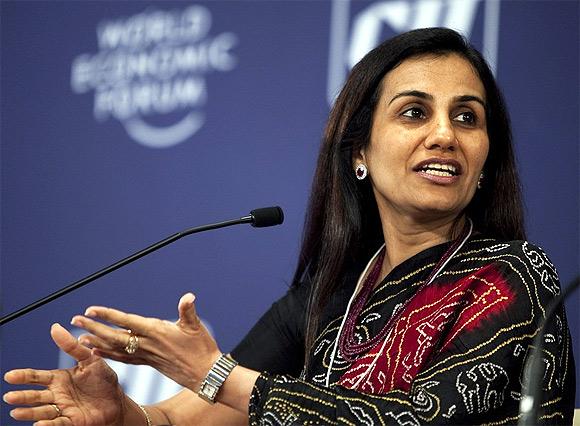
"Yes, there is a sea change in investor sentiment towards India. India has always had strong potential, and now the new leadership of the country has given investors the confidence that we will act to realise this potential," the ICICI Bank chief said.
Kochhar, who has been attending WEF Annual Meetings in Davos and other global summits for a long time, said the confidence in the India growth story is seeing a major uptick this year and would soon start yielding results.
"India is a large consumption market and is expected to get bigger – making it an attractive destination for foreign companies," Kochhar told PTI in an interview.
According to her, the country is also now focusing on infrastructure development. "It is not just power and roads but urban development, water, sanitation, smart cities, railways, rail and port connectivity and so on - these can be big opportunities for foreign investors.
"I believe that India's long term growth story is strong and foreign investors are keen to be a part of it," she added.
Asked about World Bank chief Jim Yong Kim's recent remarks that India is one of the few bright spots in an otherwise mediocre global economic outlook, Kochhar said that hearing such views is "quite common" today.
"There is a lot of foreign interest again in India with the new government in place. We believe that the Indian economy is expected to grow at a healthy rate over the next decade, driven by robust growth in domestic consumption and investments.
As I mentioned, I think everyone, both domestic and foreign, would want to participate in this growth," she added.
On whether the banking sector and its corporate clients are satisfied with the pace of the new government delivering on its promises, Kochhar said: "Seven months is a short time..." "... but I think that the Prime Minister (Narendra Modi) and his government have articulated their commitment to growth-friendly policies, administrative efficiency and ease of doing business, as well as ensuring macro-economic stability and maintaining fiscal discipline."
Kochhar, who heads the country's largest private sector bank, said the government has recognised the importance of foreign capital and its role in bringing in technology as well as international linkages.
This is reflected in decisions like allowing foreign investment in defence, increasing foreign ownership in insurance (subject to parliamentary approval) and 100 per cent foreign direct investment in railways and addressing challenges in the coal sector and land acquisition procedures, Kochhar added.
"It (government) is also looking at taking action to rationalise and modernise labour laws, fast track environmental regulations and clearances and streamline government approval procedures.
"It is putting in place building blocks to improve the business environment substantially and remove the hurdles which have impeded India from achieving its potential growth," she said.
"I think the corporate sector is very encouraged by the approach of the government and the steps it is taking.
As these steps bear fruit and cash flows start coming in, we will start to see the next investment cycle," she added. Asked whether the goals of ambitious programmes like 'Make in India' and 'Digital India' were achievable, Kochhar said, "These goals are definitely achievable and with the direction given by the Prime Minister and his government, we expect to see progress on all fronts".
"ICICI Group has always been a catalyst in India's growth and continues to support the country in every sphere. We have a vision of a strong and prosperous India and an equally strong belief that this vision is achievable," she said.
Kochhar said ICICI Bank has been supporting the industrial sector for decades now.
"Over the years, we have financed projects in core industrial sectors like steel, cement, aluminium and petrochemicals and in manufacturing sectors like automobiles and textiles.
"ICICI has played a key role in financing infrastructure in India, across power (including India's largest private sector hydro-project); ports; roads and highways; airports (including India's first greenfield airport and its largest airport modernisation project); and telecom," she said.
As India changed and the needs of the Indian people evolved, ICICI stepped in to meet the aspirations of India's growing middle class by rapidly expanding the retail loan market, she said. "This has a cascading positive impact on the industrial sector through the demand that it creates," Kochhar added.
"Through our global presence, we are facilitating trade and investment flows to and from India, and serving the vast non-resident Indian community," Kochhar said.
On Digital India and ICICI Bank's participation in this initiative, Kochhar said leveraging technology to bring in innovative and world class services to the customers has been part of ICICI's core strategy since inception. "Creation of a Digital Bank has been a key focus for us and this has given rise to a multi-channel banking delivery strategy like ATMs, Internet, phone, mobile, fully automated Touch Banking branches, Tab and even social media banking.
"Inspired by the 'Digital India' mission, we have made an attempt to convert Akodara village in Gujarat into a 'Digital Village'.
'This is but an attempt by one organisation in one village – we hope that it will catalyse similar initiatives across the country," she added.